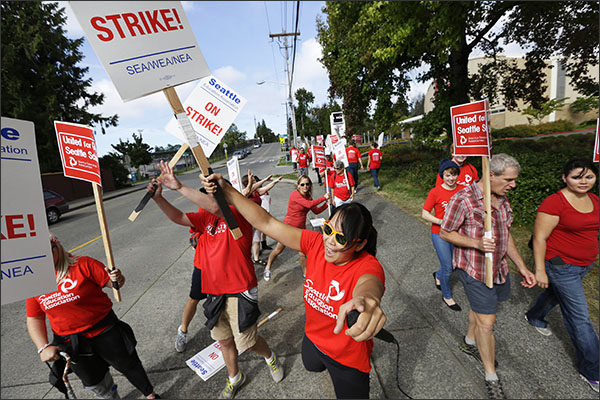An editorial by The Olympian today reveals just what that newspaper’s editorial board thinks about public employees who don’t want to be forced to pay for union representation they don’t want. And it isn’t flattering.
In an editorial condemning SB 6079, a bill designed to thwart efforts to contact home care providers to educate them on their right to reject paying union dues or fees to SEIU 775, The Olympian correctly explains how the bill would circumvent the state’s Public Records Act and reduce government accountability. But in the process of explaining that conclusion, the editorial board takes several backhanded swipes at the efforts to inform workers of their right to not pay the union and the workers who chose to exercise that right.
Referencing the U.S. Supreme Court’s decision in the landmark Harris v. Quinn case that quasi-public employees (those considered state employees solely for the purpose of collective bargaining), such as home care providers, cannot be forced to pay for union representation, The Olympian editorial board laments that the Court’s decision “opened the door to undermining the ability of public sector and quasi-public sector unions” to collect agency fees. The editorial board goes on to declare such agency fees “cover the cost of bargaining and are reasonable.”
What follows is a glowing review of how the union’s forced representation of home care providers has helped improve their wages and working conditions, all at such a “reasonable” cost. No mention is made of how the union benefits from the millions of dollars of guaranteed revenue generated by the forced unionization scheme. The SEIU’s collection of mandatory dues and fees from Washington state’s home care providers amounts to a staggering $27 million for that union each year.
Also unmentioned is the obvious point that if the union’s services are really such a great value, they shouldn’t need to force anyone to pay for them. Home care providers should be flocking to voluntarily join the union.
The editorial then declares that while most workers (presumably the enlightened ones) “can see that union membership gives them bargaining power,” any worker who disagrees that those fees are reasonable and opts-out of paying them is essentially trying to take advantage of the “ability to get pay benefits without paying dues or fees.” The Olympian is parroting unions’ kneejerk “free rider” claim against giving workers a choice in whether they want to pay a union to represent them.
That claim directly contradicts what a former AFL-CIO state president says motivates rank and file union members. Ben Johnson, the former president of both the Vermont American Federation of Teachers and Vermont AFLC-CIO, says the free rider who covets the benefits of union representation but doesn’t want to pay is a union-propagated myth:
“I don’t remember meeting any free riders who refuse unionization just to save a buck. I have, however, talked to plenty of people who despised the union they were forced to support, who wanted nothing to do with it, or who sullenly put up with union hegemony because there was no real alternative, like the sad inhabitants of a totalitarian, one-party state. I’ve met plenty of these folks–disgusted, disappointed, whose rights have been infringed. But I haven’t met a single one of the mythical characters union lawyers talk about in court: that is those fantastic beasts who benefit from all the advantages union membership can confer but chuckle into their hands over the great deal they get without paying full price.”
I would wager the former president of both the Vermont American Federation of Teachers and Vermont AFLC-CIO knows a heck of a lot more about the motivations of union members than the editorial board of The Olympian.
The reality is not every home care provider thinks they benefit from being forced to pay a union for representation they don’t even want. Many home care providers are caring for a family member or friend. They have no interest in paying union dues or fees for the privilege of caring for their loved one. Especially when the union uses their money to support or oppose candidates and issues that contradict their own beliefs. They simply want the state assistance money they receive to provide care, to actually go to the care of their loved one—not to support a union agenda.
Instead The Olympian editorial board is buying into the union sound bite that giving workers a choice is nothing more than an effort to “undermine” or bust unions. Perhaps the editorial board should take the time to talk to some of those home care providers, instead of relying on union talking points.





